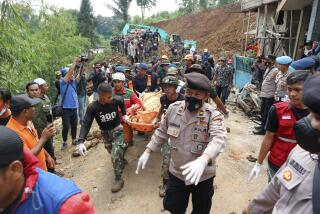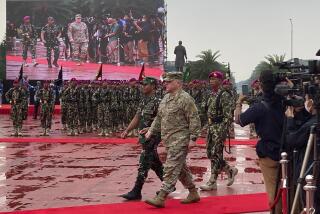U.N. Secures Wider Control Over E. Timor
- Share via
BAUKAU, East Timor — With peacekeepers extending their mission, control of East Timor’s second-largest city passed, without a shot being fired, from the Indonesian military to 100 Australian and Philippine soldiers of the U.N.-sanctioned force.
“It was tense for a few minutes when we came in two days ago,” Philippine Capt. James Balaino said Monday. “They stared us down with cocked rifles at the ready. But the hostility didn’t last long. I think they were happy to leave.”
Baukau, a Japanese base in World War II that has been under de facto Indonesian military rule for the last 24 years, has strategic value for the peacekeeping force. With the longest airstrip in East Timor, it will be the major distribution center for food, medical supplies and blankets for the territory’s eastern sector.
The Indonesian military said it formally handed responsibility for security in the entire territory over to the U.N.-approved force Monday. The Australians said the peacekeepers will share responsibility with about 1,500 Indonesian troops who are remaining. But it was clear that effective control had been turned over to the peacekeepers.
However, East Timor’s problems are far from over. Reports emerged Monday that Roman Catholic seminary students, two nuns and others on a mercy mission to Los Palos, 20 miles east of Baukau, had been attacked and killed.
The Catholic bishop of Baukau told a Portuguese radio station that nine people had been killed. The Rome-based Roman Catholic Missionary News Service said 16 people were slain, including the mothers superior from Baukau and Manatuto.
Before the last contingent of 550 soldiers in Baukau boarded a military plane Sunday for Jakarta, the Indonesian capital, the Indonesians left their usual calling card: They destroyed or trashed everything in sight, including 35 U.N. vehicles, their compound at the airfield, their generators and equipment and rooms.
“Pigs wouldn’t live here now,” said Capt. Monico Abang, opening the door to the litter-strewn Room No. 4 in the officers’ billet. The occupant had drawn a cartoon on the wall of two Indonesian soldiers torturing an Australian. In the balloon above the Australian was written in English: “My God, please help me.” And one of the Indonesians was depicted replying: “Mister, you how? Indonesia is best hero.”
Baukau, a ramshackle city of 50,000 people located 50 miles east of Dili, the territorial capital, was extensively damaged--though much less so than Dili--in the rampage by anti-independence militias that followed East Timor’s vote for independence Aug. 30 in a U.N.-sanctioned election. Residents said the militias had left Baukau.
A teenage girl, among the hundreds of people who came out of the mountains Monday to occupy the air base they had not even dared pass when it was occupied by the hated Indonesian soldiers, said “many, many people” were killed in the militia rampage.
Asked where they were buried, she became vague and said, “In the mountains someplace.”
Residents in Ermera, Becora and some other places where the death toll was said to be high are similarly vague when asked the same question. Human rights workers, who had expected to find mass graves in East Timor--and may yet do so once extensive searches begin--say the ultimate number of dead may be less than was at first believed. Pro-independence activists had placed the figure as high as 20,000.
At the United Nations, officials reported that an assessment mission to Manatuto had found 80% of the buildings burned down. The town, located about halfway between Dili and Baukau on East Timor’s north coast, was made a top priority for emergency aid.
The World Food Program conducted airdrops of food because of a shortage of trucks to transport supplies.
With the Australian-led peace-keeping mission in East Timor a week old Monday, the force has grown to 3,700 with the arrival of a Malaysian contingent. It has secured most of Dili and begun inserting soldiers into the countryside. Baukau represented the first major deployment outside Dili.
Australian force commander Maj. Gen. Peter Cosgrove has chosen a methodical, cautious approach to deploying his soldiers to minimize casualties. Thus far, the Australians have not had to fire their weapons.
Cosgrove told reporters Monday that Indonesia had withdrawn 15,000 troops from East Timor in the past week and within a few days would have only 1,500 still on duty here, mostly in Dili.
Among those leaving Monday was Maj. Gen. Kiki Syahnakri, who became commander of Indonesia’s East Timor forces after martial law was declared here by the Jakarta government earlier this month.
Syahnakri told the Jakarta Post before leaving that withdrawal of the Indonesian soldiers could pose security problems for the peacekeeping force. He said the large military presence had been a deterrent to militia attacks on the multinational unit and that now that deterrent would be gone.
Australian commanders did not see it that way at all. They, and others, say that the militias acted as surrogates for the military and that, without military support, the militias’ capabilities are greatly reduced.
Using diplomatic parlance, Cosgrove’s chief of staff, Col. Mark Kelly, said, “Fewer numbers of TNI [Indonesian soldiers] obviously reduces the potential for tension.”
In more direct terms, a senior peacekeeping officer added: “We’re happy as hell to see them go. They’ve been the source of the problem all along.”
Although some good Indonesian soldiers and some good units have served in East Timor, the army’s overall performance since Indonesia invaded the territory in 1975 has included torture, corruption, many killings, utter disregard for the people it was sworn to protect and, finally, the execution of the most thorough scorched-earth policy Southeast Asia has seen since World War II.
With Dili generally calm Monday, Australian troops carried by Blackhawk helicopters and armored personnel carriers moved into Liquica, 18 miles to the southwest. There were no initial reports of resistance, though a small number of militiamen were seen fleeing Liquica as the peacekeepers advanced, pool reporters said.
In April, militiamen, acting while uniformed Indonesian police stood idly by, massacred about 25 refugees who had sought refuge in the courtyard of a Catholic compound in Liquica. The killings were what turned the world’s focus on East Timor and began the international criticism of Indonesia that continues to this day.
*
Times staff writer John J. Goldman at the U.N. contributed to this report.
*
* INDONESIA GETS ULTIMATUM: Rein in militias or lose international loans, U.S. secretary of State warns Jakarta. A10
More to Read
Sign up for Essential California
The most important California stories and recommendations in your inbox every morning.
You may occasionally receive promotional content from the Los Angeles Times.













